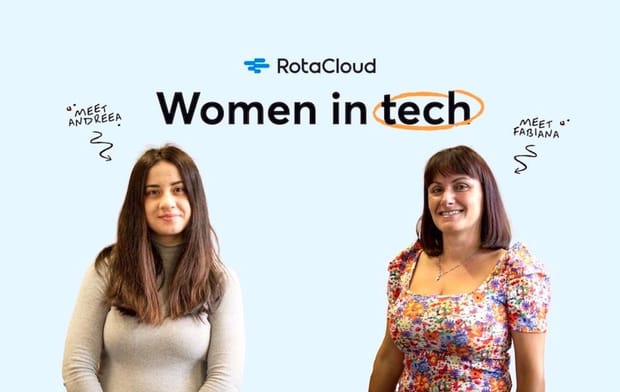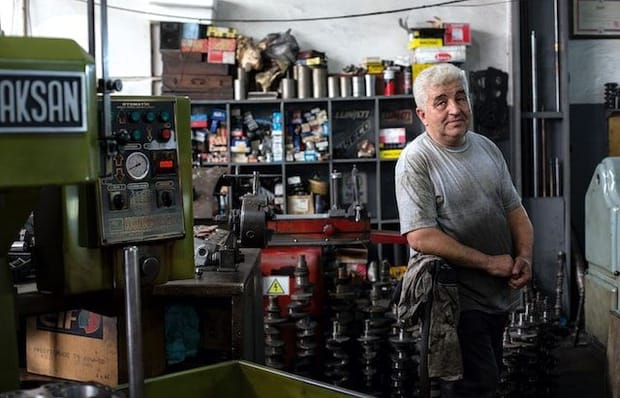Even though the tech industry is gradually growing more diverse, a sizeable gender gap still exists. Currently, women make up only about 20% of people in the sector.
So how do women get into tech? And is one way better than another?
We talked with four women working in technical roles at RotaCloud to find out how they came to do the jobs they do.
Q: What’s your current role?
Anna: Front-end developer on the website team.
Fabiana: I’m a back-end developer.
Andreea: I’m a mobile developer working with React Native.
Jennifer: I’m a software tester working on a web app, mobile app and automated tests.
Q: Were certain qualifications or experience essential or helpful for the role?
Anna: Experience-wise, probably the researching skills from my degree and previous marketing roles. You need to be good at Googling to be a developer! In my opinion, experience is more important than any qualification.
Fabiana: No qualifications were essential to be considered for the role, but I had to prove an understanding and basic experience with the frameworks and languages used by the back-end team.
But to help me out with that, while still in my previous role, I was given the opportunity to shadow the team one day a week to gain more understanding of the back-end workflow.
Andreea: It was necessary to have experience in developing React Native and JavaScript apps. And I would say that another criteria is the willingness to learn new things — constantly! The interview process consisted of three steps: a home coding exercise, a tech question interview, and a culture fit interview.
Jennifer: None. I got into testing with a biology degree and no experience in the tech industry. The most important thing to have is a willingness to investigate problems and find answers, and that can be learned in lots of different ways.
Q: How did you end up working in tech? (And has your path been linear?)
Anna: I think I always had many of the right skills to work in tech but saw it as something intimidating and not for me. I have several friends who studied computer science at university, and they’re super into it and so knowledgeable — comparatively, I guess I didn’t feel I met the ‘criteria’.
I don’t think I could have foreseen becoming a web developer until I was a couple of years into my marketing job at RotaCloud — and then it was a couple of push and pull factors that got me there:
- Push: not really enjoying some elements of marketing or wanting to commit to it as a lifelong career (the senior roles just didn’t appeal to me).
- Pull: something better suited to my strengths, loads of different things to learn and potential paths to take, and encouragement from the developers I worked with. (If I hadn’t been sitting near developers in the office, I don’t think I’d have had the confidence to pursue this path!)
Fabiana: My path has been anything but linear. I discovered a passion for web development when I decided I wanted to build my own website of cooking recipes!
My background is in educational studies and I worked with children with special needs for years. But, because of a growing passion for web development, I decided I needed a less demanding job and I started working in a restaurant. I did this for about eight months, while teaching myself how to code and developing projects to showcase during job interviews.
Andreea: My path into the sector was an internship. It was only for three months, but I’ve been working in tech ever since.
Also, I think it’s important to mention that I applied to other internships where I failed the interview process, but I kept trying and one of them accepted me. So don’t be put off if the first place you try knocks you back!
Jennifer: I had always planned to do a PhD, but after getting my Masters degree I was pretty burned out with academia and decided to get a job instead. The only problem was that I had no idea what I wanted to do, since I had been fixed on the idea of a PhD for so long!
So I started looking into jobs that would be pretty secure, pay well, allow me to live wherever I wanted, and that I could do with a biology degree. I landed on a graduate scheme that trained non-IT graduates and got them jobs in the tech industry. I had a choice between going down a business path, such as project management, or a technical path, such as developer or tester — and I went with testing! Since then, it’s been pretty linear, moving between a couple of different testing jobs before landing this one at RotaCloud.
Q: What do you like and dislike about tech?
Anna: I like:
- The learning opportunities. There’s always something new so things never get stale. That’s a big motivator for me, as I don’t like feeling that my brain is coasting along every work day.
- How accessible most tools are. So many important development tools are open source, so you don’t really need to pay a lot to learn and grow. The open source ethos is great, as you can follow and contribute to loads of fantastic projects and tools.
- Solving problems every day is really satisfying.
- Career options. Things change super-fast in tech, but there are loads of different ways you can choose to specialise, generalise, or branch into management. The core skills you learn as a web developer can be applied to many different roles.
I dislike:
- The obsession with side projects. As a developer, you’re expected to have several side projects on the go outside of work — to try out new technologies and learn new skills. But for developers with kids or other caring responsibilities (or for any other reason for that matter!), it’s not feasible — and perhaps not healthy — to have too many projects on the go. I definitely see their value (I’m working on a couple of things), but would we expect a sales rep to keep selling at the weekends, or a marketer to spend their evenings researching new SEO tools? There’s something about this element of ‘dev culture’ that feels a little off to me.
- Battles between fans of various technologies. Whenever a ‘hot new framework’ or tool arrives, a subsection of developers jump on the bandwagon and become champions of it — defending it while talking down other similar solutions. When, in many cases, the old tech does the job just as well. The new shiny thing is not always best.
- The jargon. I know that every role has its language, but some tech terms are particularly grating: ‘serverless’ (which doesn’t mean ‘without servers’), ‘code smell’ and ‘t-shirt size’ to name a few!
Fabiana: I like that there is always something new to learn, and it always amazes me how things work behind the scenes — even simply loading a page on the web.
I dislike the expectation amongst developers as a whole that I should spend my spare time exploring new technologies. Most of the time I do it because I enjoy it, but I don’t think it’s fair that it’s expected in our industry.
Funnily enough, this job tests us more than we test the software sometimes. It’s hard to not feel inadequate, as there’s so much to learn and the time at work isn’t always enough. So your spare time often has to go into it.
Andreea: I like how the tech sector is constantly changing and evolving, and the communities that form around technology. Related to my day-to-day job, I really enjoy the challenge of solving a problem. I’m not a big fan of meetings, even though I understand their importance, especially when working in a team.
Jennifer: I love the puzzle-solving aspect of my work — digging into a problem to try and isolate what went wrong, or figuring out how to recreate something that has only happened once.
This also applies to writing code for automated tests, as it can be a puzzle trying to figure out how to tell a computer to do something that seems very straightforward! I also have a nerdy love of completing lists, so I like making them for anything that needs testing, and ticking everything off when it works.
As for dislikes, sometimes testing involves a lot of repetitive work, especially towards the end of a project when the majority of knotty problems have been solved. That can get a little boring, but I guess every job has its less exciting parts.
Q: What changes would you like to see in the sector?
Anna: A greater appreciation and recognition of the importance of soft skills (planning, teamwork etc.). At the moment, if you’re a really good developer who doesn’t bother with soft skills, people tend to accept that and work around it — which isn’t always great for the rest of the team.
I would also like to see some sort of industry-wide discussion about cultural and diversity issues in the sector. There’s so much variation in how organisations think about diversity, and I think there’s a lot to be gained by learning from companies that have got it right (or are actively heading in that direction), and calling out the places where harassment and discrimination are still a problem.
Andreea: I would like to see more women working in tech! And for there to be a gender balance across teams.
Jennifer: I’d like to see more people with a background in Arts or Humanities getting into tech. The vast majority of people I know in the sector have a STEM (Science, Technology, Engineering and Maths) background, and those who don’t are usually in customer facing or business roles, rather than technical positions.
Development does require a lot of skills that STEM subjects focus on, but creativity and original thinking are just as important. I think Arts and Humanities students could bring an important new perspective to our industry.
Q: If money, location and experience were no object, what role would you most like to do (if you’re not doing it already)?
Anna: My dream role would probably be something to do with data visualisation, GIS (maps), and publishing it all online — and explaining it. That would combine web development with my love of geography and data visualisation, and also give me an opportunity to share information in a format that’s accessible to all. It’s the sort of thing that’s more likely to be a side project though, at least in the medium term!
Fabiana: I’d be a cloud engineer.
Andreea: With more free time, I’d like to learn how to be a 3D animator — to know Maya or Blender and how to model and animate characters or scenes. I’m inspired by Danielle Feinberg and, though I don’t see myself doing it as a day-to-day job, I'd like to know more about it.
Jennifer: I think I’d still like to be a tester, but maybe in a different part of the industry. I think robots are really cool, especially ones that people can have in their houses doing little jobs. I’d like to test those.
Q: Is there anything else you’d like to share that you feel is important?
Anna: Development really isn’t as intimidating as it looks!
It’s all about patterns and problem solving. Once you understand the patterns, and know how to systematically solve problems and find solutions, everything becomes much clearer. You'll always be learning and going outside of your comfort zone in terms of code — but that means you constantly surprise yourself with what you can achieve! With the right mindset, you can solve problems that might have seemed impossible only a few months ago.
Fabiana: Dare to try things that you don’t know, or are afraid to explore because they are too difficult! There are so many resources for free and people are always happy to help.
Andreea: This was the path that led me to where I am, but there may be many other options. There’s not necessarily a "written" path to get into tech. Some people may go to college or attend boot camps, others will take courses or even be self-taught. The two things I would say are essential for a career in tech are perseverance and a desire to always be learning.
You need to find your own path and what works for you. We don’t all start from the same point in life, and none of us have the same opportunities. But the beauty of humans is that we are all different, and how we can thrive by creating our own stories.
Jennifer: 1) Don't be intimidated by how much you don't know, since a lot of work in tech is Googling - most people in tech spend most of their time not knowing things, but then finding them out. 2) The best way to clean a dusty keyboard is with a clean, dry makeup brush.
Woman or not, it seems there is no single way into the tech industry. Rather, the biggest barrier is perhaps the perception of what’s needed to get through the door — especially in terms of skills and qualifications.
But if the experiences of a marketer, an educator, a biologist, and an intern are anything to go by, then tech may actually have one of the most modern and inclusive recruitment attitudes out there. But how, and where, do we communicate that in order to reduce misconceptions and close the gender gap?
Ultimately, it needs to begin at an education level. All young women and people need to learn that tech is a viable and accessible career option, with multiple avenues leading to the sector and many skills valued within it. By transforming formative attitudes, we should start to see a shift in the diversity of our workplaces.
But change takes time, so tech companies must also play an active role. As employers and representatives, it’s up to us to help close diversity gaps as quickly and effectively as we can.
At RotaCloud, one of the things we’re doing is partnering with Northcoders to encourage more women into the sector. We’re offering a fully-funded place on the Northcoders software developer training programme, with the option to complete a six month paid internship here at RotaCloud at the end of the course. To find out more or to apply, go to RotaCloud.com.
If you have experiences you’d like to share, or would like to work with us to help to improve diversity, please get in touch via LinkedIn, Twitter or our website.






